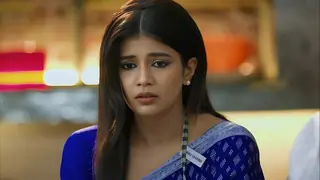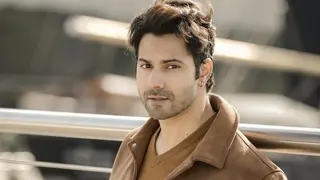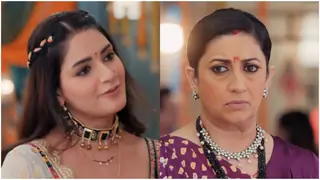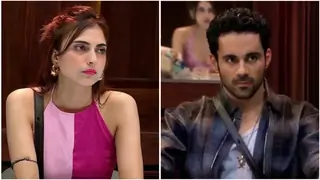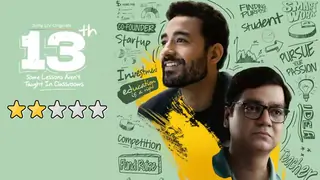| Some reports say that he has sold more than 40 million albums worldwide; others put the number at a cool 100 million. Dozens of hit movies bear his name in the credits. With one musical already on Broadway, he is busy penning the score for a version of The Lord Of The Rings that's slated for a West End bow in winter 2005. This, clearly, is a man playing at the top of his game. And yet, for most Americans and Europeans, the question is still, "AR who?" AR Rahman, that's who. Just over a decade ago, the now 38-year-old Chennai (Madras) native broke out of a life writing commercial jingles and playing keyboards as a studio musician to become one of the most lionized figures in the vast and churning world of Indian film. He was born AS Dileep Kumar to a musically inclined family. His father, KA Sekar, who passed away when his son was nine years old, was a well-known music director in the Chennai film world. (Although Mumbai's "Bollywood" is far better known to foreigners, South India has its own separate film industry that is by some reports even bigger than that of the north, which itself sees somewhere around 800 new releases every year.) Rahman began studying the piano at age four, and dropped out of school to begin work as a studio musician by the time he was 16 years old. He eventually earned a scholarship to attend Oxford University's Trinity College of Music, from which he earned his degree. From early on, Rahman's family environment shaped his joy in music and in making music. "My earliest memory of music," the composer recalls, "comes from when I must have been five or six years old. In front of some of his friends, my father pulled out a harmonium and asked me to replicate the notes." When his first film break came in 1989, it was thanks to the award-winning music he had written for a television advertisement; the director of that Leo Coffee commercial, Sharada Trilok, introduced him to her cousin, Mani Ratnam. Ratnam, in turn, signed Rahman on as the composer to what became a hugely successful 1992 Tamil-language film called Roja, set against the backdrop of the bloody Kashmiri separatist movement. Roja's soundtrack—which wove pop, rock and reggae elements into the filmi sound—was not just the composer's calling card; it was also the movie to catapult him to fame. After Roja's initial release, Rahman garnered the Best Music Director nod in both the Tamil Nadu state film prizes and in the prestigious Filmfare Magazine Awards (within the southern India category). Rahman's Roja fame surged once again in 1995, when the movie was dubbed into Hindi and re-released in northern India; at that point, Rahman won Filmfare's prestigious R.D. Burman Award for Best New Talent. Since his first win, Rahman has garnered no less than 16 Filmfare trophies. The Rahman-Ratnam partnership has itself become the stuff of legend; after Roja, the duo went on to create some of the most celebrated films of the 1990s, including two other films that completed a trilogy of sorts after Roja: 1995's highly controversial Bombay, which positioned a Hindu-Muslim love story against the backdrop of the title city's 1993 religious riots, and 1998's equally contentious Hindi-language Dil Se, which set yet another love story in another emotionally combustible setting, this time, within the insurgency and counterinsurgency movements in the eastern Himalayas, featuring a female suicide bomber as the love interest. In writing the Roja score, Rahman reconceptualized what Indian filmi music could be, and more than a decade later he still sets the standards for other composers to follow. In the meantime, Rahman's reach is growing ever wider, particularly in the wake of the Andrew Lloyd Webber-produced Bombay Dreams, the Bollywood-inspired musical with music by Rahman that opened on the West End in June 2002 and on Broadway in April 2004. The Broadway Bombay Dreams features a storyline heavily reworked from its British cousin. Despite the changes, however, the musical received mostly poor reviews in both its British and American incarnations—though many critics singled out Rahman's music as a high point—and Bombay Dreams closed in London this June. However, producers are currently planning a two-part U.K. relaunch later this year, first in a touring production of England (in its Broadway version), which will then be followed by a remounting of the revised musical at a smaller London venue next year. Musical theater aficionados who have seen Bombay Dreams on Broadway may wonder if the American version of the musical will ever make it to disc. Sony Classical, which recorded the original U.K. cast album, has no plans to record the revamped version, citing the massive and prohibitive recording costs that such a project would incur. Rahman says that despite the musical's troubles, it offered him a great chance to work in a completely new environment. "When we started this, I didn't have a clue about doing musical theater," Rahman laughs, "so it was a real learning experience for me to understand what works on stage and what doesn't. Andrew was there to help me learn all this. Although I was very sure that working on a stage production was a completely new culture to me, I was prepared for both the good and bad. And we got both the good and bad!" he says wryly. Rahman also says that interpreting Indian music—its colors, melodic styles and rhythms—for a Western audience was also a challenge. "That was a challenge to explain this music both for the audience and for many of the performers (who aren't South Asian)," he explains. "It's like a new food, you know—it takes time to get used to it. And I really think that some of the bad reviews came from the fact that the critics weren't used to this kind of 'food.'" The composer also notes that Bombay Dreams also offered him an arena to try out new twists of very familiar—and very entrenched—musical forms. "One of the exciting things was not just putting this Indian culture on stage, but moving it forward—breaking the rules," he continues. "For one thing, both South Indian and North Indian music is very bound to rules and restrictions. But I found things that worked better once I changed some of the modes and added harmonies." Despite Bombay Dreams' struggles, Rahman's profile in the U.K. and the States has received an immeasurable boost, thanks in no small part to Lloyd Webber's advocacy. Rahman is currently at work on an orchestral piece commissioned by the City of Birmingham Symphony Orchestra, to be based on the classic 12th century Sufi text "On the Conference of the Birds," a lengthy allegorical poem by Persian mystic Farid Ud-Din Attar. Rahman has already collaborated with the CBSO once before; in March of this year, he conducted a "greatest hits" program of his most popular Bollywood hits, including the music to the smash films 2001's Lagaan (the first Indian film ever to be nominated for an Oscar as Best Foreign Film) and Roja. The CBSO included Rahman as part of its "Classic Asia" series, an effort that was driven by a desire to bring a more multicultural audience into its Symphony Hall home; the Asian Indian community was the CBSO's first target outreach group. (Despite U.K. press reports that the Conference Of The Birds piece will debut this year, the perpetually overbooked Rahman says only that he will finish the piece "in the next year or two.") Organizers hope that the CBSO collaboration presents a great opportunity for both composer and orchestra. The March concerts marked Rahman's first appearance conducting a live symphony concert, although he regularly conducts filmi musicians at home in the studio. In addition, On The Conference Of The Birds will be the South Asian superstar's first concert piece. In preparation, Rahman is listening to a great deal of Western classical music these days, including Leos Janacek's Glagolitic Mass, Verdi's Requiem and Berlioz' Requiem. "It's all fantastic stuff," Rahman enthuses, and perhaps, not surprisingly, there are common denominators at work in the three pieces he namechecks. All of these works corral massive forces, and all three composers are masters of tone color, elements that he no doubt wants to draw upon for his collaboration with the CBSO. Alongside the live performances of his work, Rahman's presence on record is also on a steady uptick. The Bombay Dreams soundtrack was just the first among an ongoing partnership with Sony Classical; in May, the label released another Rahman album entitled Between Heaven And Earth, and he is slated to contribute a track to crossover violinist (and fellow Sony Classical artist) Vanessa Mae's next album, which is slated to be released in the U.S. early next year. Although Between Heaven And Earth was first penned as the score for the Chinese film Warriors Of Heaven And Earth, directed by He Ping, Sony Classical is promoting this project as a concept album that explores music from many Asian cultures. (After the success of the Silk Road Project recordings helmed by Sony Classical's marquee artist, the superstar cellist Yo-Yo Ma, the urge to pull Rahman's work into that circle must have been irresistible to label execs.) "Even when I started working on my first movie, Roja, I didn't want to limit myself to one tradition," Rahman observes. "And I truly believe that every folk music in the world has a connection," he continues. "If you take Gujarati music and Arabic music and Spanish music, for example, they all have a connection. So when you go into the root and heart of all these forms, you can get away with mixing everything! When I started out in India at the beginning of my film career, I was already hearing the complaints of people saying, 'Oh, this is too different, I can't get used to it.' And then eventually some of them can't live without it!" he says with a laugh. "Making The Lord Of The Rings come alive on stage is a big challenge," Rahman observes. "Right now, we're in a workshop mode and working hard." He demurs, however, from talking about what TLOTR will actually sound like. "I'm keeping it a surprise," he says. Rahman's name change came when he converted to Islam in the late 1980s. He is now a devout Sufi. This branch of Islam emphasizes a mystical, ecstatic connection with God and the universal qualities of divine love and peace. "Sufism is of course about the love for God, and that love above everything else. Whatever comes in between us, we must release. Music connects that love with God, and Sufism in turn connects music with God. I also believe that music has healing qualities, and that it can heal hatred and so many of the world's other ills. It's amazing to watch my four-month-old daughter calm down and stop crying when she hears music. It's really magical, and I thank God for it." Rahman also mentions that he is at work on a film score for Shyam Benegal's Netaji: The Last Hero, a biopic based on the life of Subhash Chandra Bose (popularly known as 'Netaji,' or revered leader), who created and led the Indian National Army against British rule and who also formed a provisional Indian government during World War II. The score for The Last Hero includes a first for Rahman: he is incorporating an important Sufi ritual—'zikr' (also known as 'dhikr', the practice of remembrance of God, often by chanting or singing the names of God), into this secular score. Clearly, Rahman has found a channel for his creativity that meshes with his spiritual beliefs. And his music, in turn, helps fuel his spiritual life. Rahman's talent has also created an opportunity for him to be an active voice for a number of charities and philanthropic efforts, from Save the Children to cancer organizations to the World Health Organization, for whom he was just named as a Goodwill Ambassador in its anti-tuberculosis campaign. While his tunes might be hummed from Delhi to Dubai to Dakar these days, AR Rahman's name is still off the radar for most Americans and Europeans, save the South Asian diaspora communities and a clutch of non-desi filmi fans. But given AR Rahman's talent, energy and ever-increasing mainstream visibility, pretty soon everyone will know the answer to "AR who?" |







 Like every other of his albums, music director A.R. Rahman's latest release "New" has quickly climbed to the top of the charts, possibly because the competition is currently not too tough.
Like every other of his albums, music director A.R. Rahman's latest release "New" has quickly climbed to the top of the charts, possibly because the competition is currently not too tough.



 No other music director creates such an expectation in the market as Rehman does. In many ways, it is unfair. Like we expect Tendulkar to score a century every time, we want a winner from Rehman every time. The thing he never fails us mostly.
No other music director creates such an expectation in the market as Rehman does. In many ways, it is unfair. Like we expect Tendulkar to score a century every time, we want a winner from Rehman every time. The thing he never fails us mostly. 

